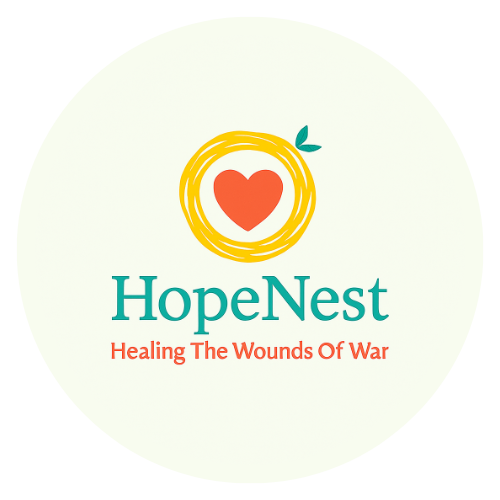🌿 ABOUT HOPENEST
Q: What is HopeNest?
A: HopeNest is a volunteer-led humanitarian organisation dedicated to restoring safety, healing, and dignity to children affected by war and displacement – with a focus on Gaza and surrounding regions. Our model centres on three core pillars: Emergency Support, Trauma Recovery, and Access to Education and Aid. We currently support children up to 16 years old through case management, therapy, and family-based care.
Q: Who founded HopeNest?
A: HopeNest was founded by Tatiana Salazar, a trauma-informed psychotherapist and humanitarian case manager. After personally been involved in the medical evacuation of several children from Gaza, Tatiana created HopeNest to ensure children would no longer be abandoned in crisis due to bureaucratic failures.
Q: What makes HopeNest different from other NGOs?
A: Our approach is deeply relational, trauma-informed, and family-focused. Unlike many large NGOs that operate at a distance, HopeNest walks closely with each family – from evacuation to long-term recovery. We integrate evidence-based mental health practices, including expressive therapies, with direct advocacy, housing support, and child protection oversight. We’re also proud to operate under a 100% donation policy, meaning every dollar donated goes directly to the children.
Q: Where is HopeNest based?
A: HopeNest is based in Australia but operates globally, with current programs active in Gaza, Cairo, and Sydney. We are in the process of registering as a Company Limited by Guarantee and applying for charitable status with the ACNC.
💛 OUR WORK & IMPACT
Q: How do you ensure donations reach the children directly?
A: HopeNest runs under a 100% donation-to-impact model. All administrative costs are covered independently, so every donation you give goes directly toward medical care, therapy, food, housing, or education for the children. We provide donors with transparency through updates, impact stories, and – where appropriate – case-specific outcomes.
Q: How does HopeNest support children on the ground?
A: We coordinate everything from urgent medical evacuations and prosthetics to trauma therapy, legal guardianship advocacy, housing, and school reintegration. Each child’s needs are assessed holistically, and care plans are developed with licensed child psychologists, trauma-informed practitioners, and local support networks.
Q: What exactly happens in an equine therapy session or workshop?
A: Equine therapy at HopeNest focuses on relational and sensory healing for children who have experienced trauma. Sessions often begin slowly, allowing the child to observe and engage from a distance. The horse’s nonverbal presence and responsiveness create a safe, regulated environment. Children may progress from brushing and leading the horse to forming emotional bonds, often resulting in a shift from shutdown to engagement. Many children begin speaking, smiling, or making eye contact for the first time in weeks. This sensory-rich, non-threatening space is especially powerful for children with PTSD, grief, or war-related dissociation.
Q: Are your modalities evidence-based?
A: Yes. All therapeutic approaches used by HopeNest are rooted in evidence-based, trauma-informed frameworks and developed in consultation with qualified child psychologists. These include expressive arts therapy, equine-assisted psychotherapy, play therapy, and attachment-based models, which have been shown to support nervous system regulation, grief processing, and emotional resilience in children recovering from trauma.
Q: Are the children in your programs orphaned?
A: Many of the children we support have lost one or both parents due to war. However, we work closely with surviving family members, including legal guardians, to provide wraparound care in a culturally respectful, legally sound, and emotionally sensitive way.
Q: How do you choose which children to help?
A: We prioritise urgent medical and psychological cases, especially children with amputations, severe trauma, or lacking safe housing. We work in partnership with doctors, social workers, government officials and local communities to triage and manage cases based on need and risk.
🧡 VOLUNTEERING & COLLABORATION
Q: How can I volunteer with HopeNest?
A: If you’re interested in volunteering, please complete our Expression of Interest Form. We want to understand your strengths and align them with our current needs. Whether you’re a therapist, creative, strategist, or student – there’s space for kindred hearts to contribute meaningfully.
Q: I live outside Australia. Can I still volunteer?
A: Absolutely. Many of our volunteers are remote. Roles include content creation, case management support, fundraising, communications, and professional consultations.
Q: Can professionals (psychologists, lawyers, doctors) get involved?
A: Yes – and we need you. We welcome licensed professionals to support with therapy, case review, legal oversight, advocacy, and refugee logistics. Our trauma-informed care model is collaborative and always expanding.
💸 DONATIONS & FUNDING
Q: How is HopeNest funded?
A: We are currently funded by individual donors and aligned philanthropic partners. All operations adhere to our 100% donation policy, where core costs are covered by independent sources and every donation is channelled directly to child-focused initiatives.
Q: Is my donation tax deductible?
A: We are currently in the process of obtaining DGR (Deductible Gift Recipient) status in Australia. Until then, donations are not yet tax deductible, but we will notify donors as soon as this changes.
Q: Can I sponsor a specific child or family?
A: While we don’t run a formal child sponsorship program, we do welcome direct case-based donations. If you would like to fund a child’s medical needs, education, or housing, we’re happy to provide guidance and updates on your impact (while always protecting the child’s privacy and dignity).
🪹 SAFETY, ETHICS & OVERSIGHT
Q: How do you ensure the safety of children in your care?
A: All children in our care are supported within a framework of child safeguarding, legal guardianship verification, and psychological assessment. We follow international standards for child protection and collaborate only with vetted hospitals, social workers, and partner NGOs.
Q: Do you partner with other NGOs or hospitals?
A: Yes. We believe collaboration is essential to sustainable care. We partner with local hospitals in Egypt and Gaza, as well as international bodies and NGOs, to ensure medical, psychological, and housing support is ongoing and legally protected.
